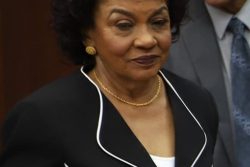IT was the tour for the players of the future to establish themselves.
With only three ODIs against New Zealand remaining, time is running out for Xavier Marshall, Sewnarine Chattergoon and Kieron Pollard.
Already, Sulieman Benn, Leon Johnson and Kemar Roach have returned home. Benn at least had a Test and a couple of 20/20s. Johnson and Roach were confined to anonymous net sessions and 12th man duties after getting no value from their solitary first-class match.
At least, they now have the early rounds of the imminent West Indies’ first-class season to put their case to the selectors.
For the others, their last week in New Zealand is essential to their prospects, none more so than Marshall.
The 22-year-old Jamaican has the makings of the star player West Indies cricket sorely needs but it comes with a volatile temperament not uncommon to those blessed with a touch of genius.
It is a conundrum that has drawn the attention of captain Chris Gayle, his fellow Jamaican who appreciates Marshall’s limitless potential.
“I take a lot of interest in him,” Gayle told reporters here.
“He needs a bit of guidance, you need to keep your eyes on him but, at the same time, you’re not going to treat him like a child. He’s a big man. He’s got a daughter. He’s a father.”
“Sometimes you see young players lose interest in the game so I try and improve him as much as possible,” he added. “Hopefully in the future he can be a bright prospect for West Indies cricket.”
Head coach John Dyson is equally concerned.
“You get glimpses of Xavier’s potential. The hardest part for our squad and their development is they’re learning on the job,” he noted.
“It’s now a matter for Xavier to work out what he needs to do to his game to bring his potential out.”
Marshall’s highest score in all matches in New Zealand going into the third ODI at Westpac Stadium here today (overnight east Caribbean time) is his battling, unbeaten 28 in difficult conditions in the abandoned ODI in Queenstown on New Year’s Eve.
He arrived with recent statistics that hinted he was set to back up his ability with numbers but on the back of troubles that have prompted Gayle, and other well-wishers, to pay him close attention.
The bold gamble by selectors to chose him for the second Test of the home series against Australia in June, purely on impulse, was validated with a stroke-filled 53 in the first innings in Antigua and a top-score 85, spread over three and a quarter hours, in the second innings in Barbados – all against a fast attack of Brett Lee, Stuart Clark and Mitchell Johnson.
When he hooked the first ball from Lee in the subsequent 20/20 in Barbados for six, it seemed confirmation that he was now ready for the big time.
He has matched such expectations only once since – a remarkable, unbeaten 158 off 118 balls with a record 12 sixes in an ODI against the associate team, Canada, in Toronto in August.
In the interim, he failed a drugs test – reportedly for using marijuana – during the Stanford Super Stars camp and was removed from the 20/20 for 20 match against England that earned the 11 victorious players US$1 million each.
Noting that it was an offence outside of its jurisdiction, the West Indies Cricket Board (WICB) sanctioned Marshall’s inclusion in the team for forthcoming series in Toronto against Bermuda and Canada, Abu Dhabi against Pakistan and New Zealand.
The Stanford incident was not Marshall’s first indiscretion. He was reported for undisclosed reasons after the 2006 Under-19 World Cup in Sri Lanka, where his scintillating 106 from 133 balls against South Africa brought him to wider attention. Two seasons back he was suspended by Jamaica for a couple of Carib Beer Cup matches.
Perhaps expectations have been too high. Perhaps such problems stem from his premature entry into international cricket.
Former head coach Bennett King was so taken by what he had seen that he influenced his selection for the 2005 tour of Australia, aged 18. A few months later, with Gayle and other senior players refusing to tour during a contract dispute with the WICB, he was opening the batting in two Tests in Sri Lanka.
It was too much, too soon. He would spend the next three years in and out of the Jamaica team as several mentors tried to have him focus his full attention on the game.
His promising returns against the powerful Australians indicated what might be. More strong opposition is imminent in home and away series against England. It is time for Marshall to prove that he is the “big man” Gayle says he is – in more ways than one.




